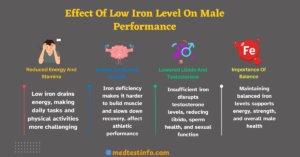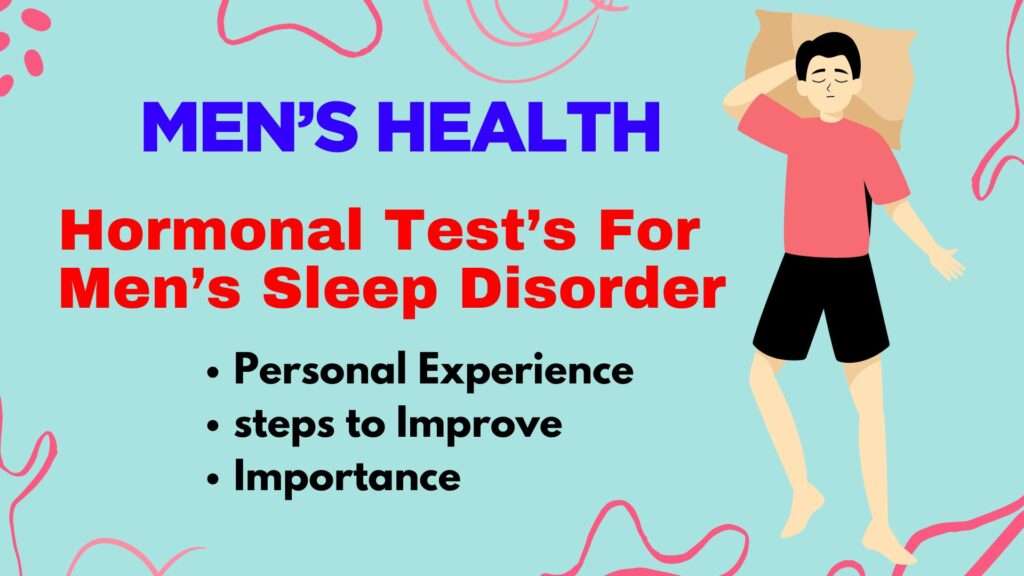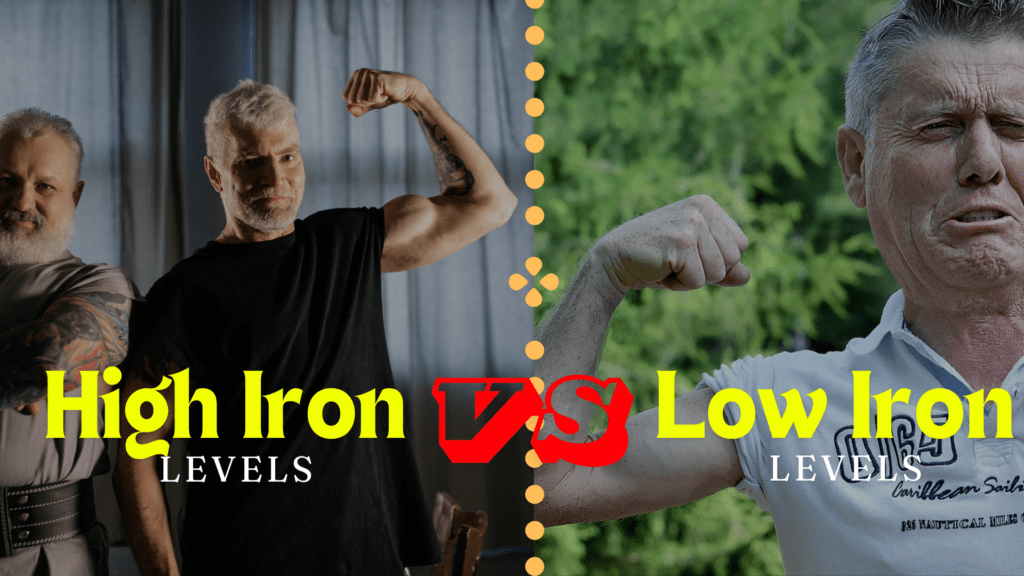
Overview
Before we get into the details of the article, let’s first understand what iron is. Iron is an essential mineral that has many crucial functions in the body. Our body has a part called hemoglobin that takes oxygen from the lungs and spreads it all over. Iron is a key part of hemoglobin. Our body needs iron to make hemoglobin. Without it, we can’t get enough oxygen to our tissues and organs.
Iron also plays an essential role in the making of myoglobin. Myoglobin is a protein that provides oxygen to the muscles, which leads to muscle growth and improves performance. In addition, iron also has a role in cellular energy production, immunological function, and hormone and neurotransmitter synthesis.
What Is Iron
People sometimes overlook iron in men’s nutrition because they mainly associate it with women’s health. Although women experience anemia more often, doctors should also monitor men’s health.
Aside from anemia, iron plays an essential role in maintaining energy levels, cognitive function, and sexual health. Many men need to learn its importance but be made aware of the need for this supplement. Here, we will learn why iron components are necessary for man’s health and performance.
Women often experience iron deficiency, but men are also vulnerable. Although men have more iron storage, they still suffer from its deficiency, especially when they do not take iron-rich food or have any disease in which the body does not absorb iron.
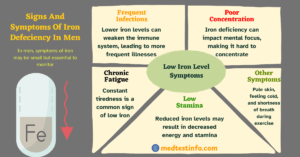
Signs And Symptoms Of Iron Deficiency In Men
For men, the symptoms of iron deficiency may be relatively small but significant. Common symptoms of iron deficiency in men include:
- Repeated infections
- Poor concentration
- Low stamina
- Chronic fatigue
Some men experience pale skin, coldness, and shortness of breath while exercising.
Women require more significant amounts of iron during pregnancy and menstruation, which dominates the role of iron in men’s health. Therefore, men ignore their iron levels until the condition becomes severe.
The Long-Term Effects Of Low Iron Levels
Men can face serious consequences if they ignore iron deficiency. Chronic low iron levels result from heart problems, immune system weakness, and lower productivity. In severe cases, it can lead to dangerous complications, such as heart failure and memory loss.
While iron deficiency is a matter of concern, their level exceeding the required limit is also a serious issue. Hemochromatosis is a hereditary disorder in which the body absorbs iron in excessive amounts; it is very common in men and can lead to serious heart problems if not treated.
What Is Hemochromatosis?
Hemochromatosis typically results when your body absorbs too much iron. This excess iron gets deposited in various body organs, such as the liver, heart, and pancreas.
Excessive levels of iron can be harmful to the body. It can cause severe conditions such as liver cirrhosis, heart failure, and a high risk of cancer. Men, especially those who have a family record of hemochromatosis, should get their iron levels checked carefully. They should take a medical approach if they experience symptoms such as fatigue, joint pain, or any abnormality in liver tests.
Who Is At Risk? Genetic Factors And Lifestyle Influences
Hemochromatosis is a hereditary disease. It means it is passed from one person to another in a family. So, men who have a family history of this disease are at high risk. However, lifestyle habits like excessive consumption of alcohol can increase the chances of this disease. Regular blood tests are necessary to manage this condition at the right time.
Iron And Male Performance
Iron is crucial for your health and significantly affects your physical and sexual performance. It boosts your capacity to do daily work. Iron can significantly impact your energy levels, strength, and libido, whether you are an athlete, going to the gym, or spending time with your spouse.
How Iron Deficiency Affects Physical Performance
Low iron levels reduce your energy, which can affect your daily tasks. Low iron levels prevent you from building body mass (muscle mass), which may make it challenging to stay active.
This reduces the performance of athletes and physically active men and takes time to recover, as their muscles are not getting enough oxygen.
The Connection Between Iron And Sexual Health
Iron is required to increase testosterone levels in men. A moderate amount of iron leads to poor sperm count and quality, decreased sexual desire (libido), and erectile dysfunction. Conversely, a large amount of iron is unhealthy for men’s health and might cause difficulties.
Iron level profoundly impacts the testosterone hormone and helps its production. That is why a moderate amount of iron reduces the level of testosterone, which leads to low sexual desire in men and also reduces muscle mass and energy. Therefore, you need to maintain a balanced iron level so that your testosterone, along with sperm and muscles, remain healthy.
Testing Iron Levels
It is vital to monitor iron levels to maintain a healthy life. You can determine your iron levels through regular tests and take action before any serious problem arises.
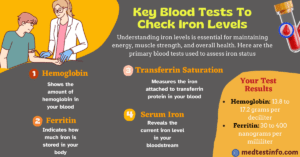
Key Blood Tests To Monitor Iron Levels
The most essential blood tests for iron are:
- Haemoglobin: Determine the amount of hemoglobin in your bloodstream.
- Ferritin: Ferritin shows how much iron is in your body.
- Transferrin Saturation: Measures how much iron is bound to the protein transferrin in your bloodstream.
- Serum Iron: Examines the level of iron present in your bloodstream.
Understanding Your Test Results: What’s Normal?
Normal iron levels may vary based on the test. Men’s hemoglobin levels usually vary between 13.8 and 17.2 grams per deciliter. Ferritin levels range from 30 to 400 nanograms per milliliter. Your doctor can assist you in interpreting these data and determining whether your iron levels are within normal limits.
You should seek medical advice quickly for every disease before the condition is severe. So, if your test result shows low hemoglobin or ferritin levels or you have symptoms of high iron levels, it is advisable to seek consultation with a qualified physician. Early intervention can help you avoid significant health issues and remain healthy.
Iron Levels And Men’s Mental Health
Iron plays a crucial role in promoting overall physical and mental well-being. Mental health is more related to brain function, mood, and memory. It would help if you balanced the iron levels because of its relation to delicate situations. Iron is compulsory for normal brain function, affecting neurotransmitter production and overall cognitive functioning. Its normal levels sharpen memory, improve focus, and help with emotional stability.
As we mentioned above, iron is also associated with mood disorders. Therefore, low iron levels can cause problems such as depression and anxiety. Low iron levels also reduce the amount of dopamine hormone, which plays a vital role in mood stability.
Maintaining iron levels can help both cognitive function and mental health support. Cognitive functions refer to a wide range of mental abilities such as memory, thinking, logical thought, remembering, figuring out solutions, making choices, and attention. Regularly check your balanced diet and eliminate deficiencies in time so you can stay mentally sharp and emotionally stable.
Top Iron-Rich Foods For Men
Consume iron-rich foods, such as:
- Red meat: Red meat is a good source of heme iron, which the body absorbs effectively.
- Shellfish: Oysters, clams, and shrimp serve as excellent sources of iron.
- Leafy Greens: Spinach and kale have non-heme iron, and you’ll absorb it better when you pair them with meals rich in vitamin C.
- Legumes: Legumes serve as excellent plant-based sources of iron, including various kinds such as beans, lentils, and chickpeas.
- Nuts and Seeds: Pumpkin seeds and cashews contain sufficient iron.
Lifestyle Changes To Increase Iron Absorption
Minor changes can improve your body’s capacity to take in iron.
Integrating iron with vitamin C: Eating foods high in vitamin C, like citrus fruits or bell peppers, alongside iron-rich meals improves absorption.
- Avoid Calcium with Iron: Calcium may restrict the absorption of iron. So, avoiding calcium-rich foods or supplements is a good idea for meals high in iron.
- Limit Caffeine: Coffee and tea contain chemicals that could inhibit iron absorption, so limit your consumption around meals.
Conclusion:
Iron is a vital mineral for men’s bodies. This mineral is more important for men because it affects physical and mental health. Its level can be monitored through regular checkups and maintained through a balanced diet. Make iron a priority so that your bodily, psychological, and sexual performance is optimal as your muscle mass, energy, and testosterone level increase.

